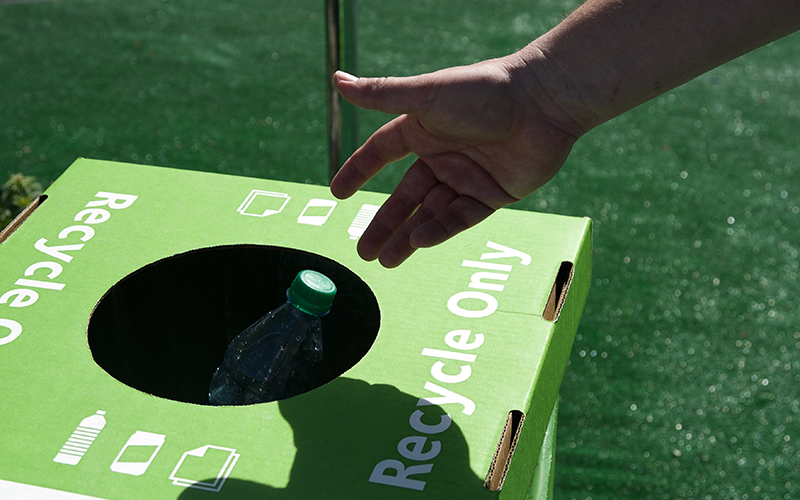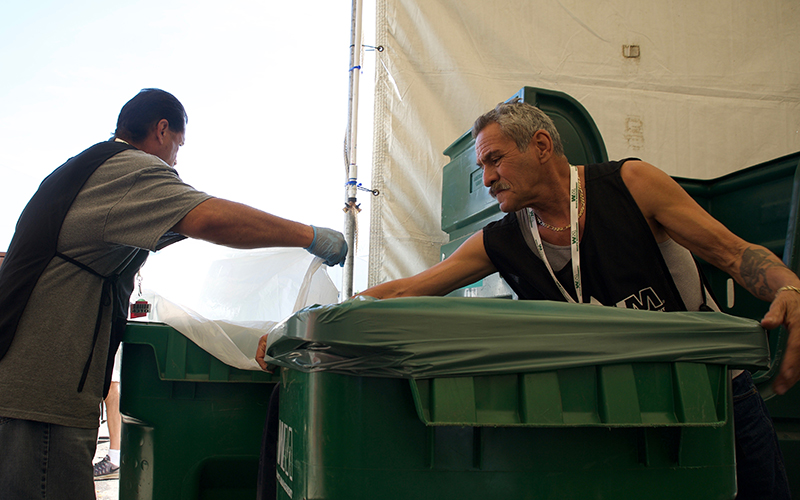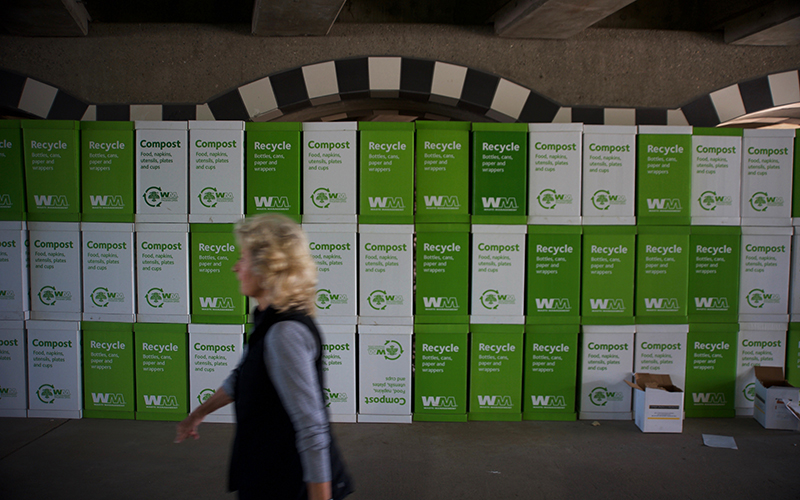
No garbage cans are at the Waste Management Phoenix Open, just recycling and composting bins. The tournament is committed to sustainability. (Photo by Jesse Stawnyczy/Cronkite News)

David Silva takes out the trash, which will be separated later by machine and manpower to make sure all recyclable content is removed. (Photo by Jesse Stawnyczy/Cronkite News)

Thousands of cardboard compost and recycling containers can be found across the grounds at the Waste Management Phoenix Open. (Photo by Jesse Stawnyczy/Cronkite News)
SCOTTSDALE — Along with more than 600,000 people filtering through TPC Scottsdale for the Waste Management Phoenix Open comes a significant amount of garbage.
Yet trash cans are nowhere to be found. Instead, 4,000 compost/recycle bins line the course, one of the reasons the tournament is the largest event to receive the Evergreen Certification from the Council for Responsible Sport.
Tournament officials say 100 percent of materials are repurposed. Fifty percent is recycled, 34 percent composted, 14 percent transformed to energy and 2 percent donated.
The first step is reusing what you have, said Paula Davey, director of sales and marketing for Waste Management. The tournament tries to maintain as many materials as possible from one year to the next, practicing what it preaches.
“I think about it like Christmas decorations,” Davey said. “You’ve got it. As long as you can store it and retrieve it when you need it, why not do it?”
The bigger challenge each year is individual waste. Food and merchandise sales result in large-scale disposables that need to be addressed. In order for that to work, each vendor at the tournament has to comply, meaning everything used within the course has to be able to be either recycled or composted.
“We don’t dictate exactly what the items are made of, as long as they’re certified compostable,” said Lee Spivak, Waste Management senior sustainability consultant. “We give the vendors their requirements. … It can be made of corn, sugar. There’s different basis for materials, as long as it breaks down to compost.”
Sustainability as it relates to water is also a priority. In the past seven years, about 31,000 gallons of water from cooking and cleaning at the tournament have been reused in the portable toilets, official said.
Examples of past sustainability efforts includes last season’s signage. Sixty-eight percent were reused from previous tournaments. Additionally, in the past seven years, the Phoenix Open purchased 100 percent renewable energy from APS, which powered all generators and most of the golf carts.
The biggest challenge for success: human error.
“People still are confused about what goes in what bin,” Davey said. “We have to take every single bag that comes out of these boxes and treat it as if there was no distinction in sorting.”
Waste Management takes matters into its own hands. Once the tournament ends, workers sift through each bag, sorting all items as either recyclable or compostable at their transfer station.
They still try to get the word out.
“Our hope is that we’re inspiring people here to live a greener life in their homes, businesses and communities,” said Waste Management communications director Janette Micelli.
To do this, Waste Management has three Zero Waste Stations set up around TPC Scottsdale, which are manned by both full-time employees and volunteers. Fans learn what can and can’t be recycled in an engaging way, improving the success rate both at the tournament and at home.
“It’s another piece of interaction for the fans, too,” Davey said. “I think there’s an entertainment value to it, but also, hopefully, an educational value.”
In keeping the tournament waste-free, Waste Management hopes those who come out to TPC Scottsdale will take matters into their own hands after seeing what can be done on a much larger scale.
“We just think it’s important to show people what’s possible,” Davey said. “If you can do it for 600,000 people-plus over the course of a week, maybe there’s something you can do a little bit more to waste less.”
Have a story idea? Email us at [email protected].